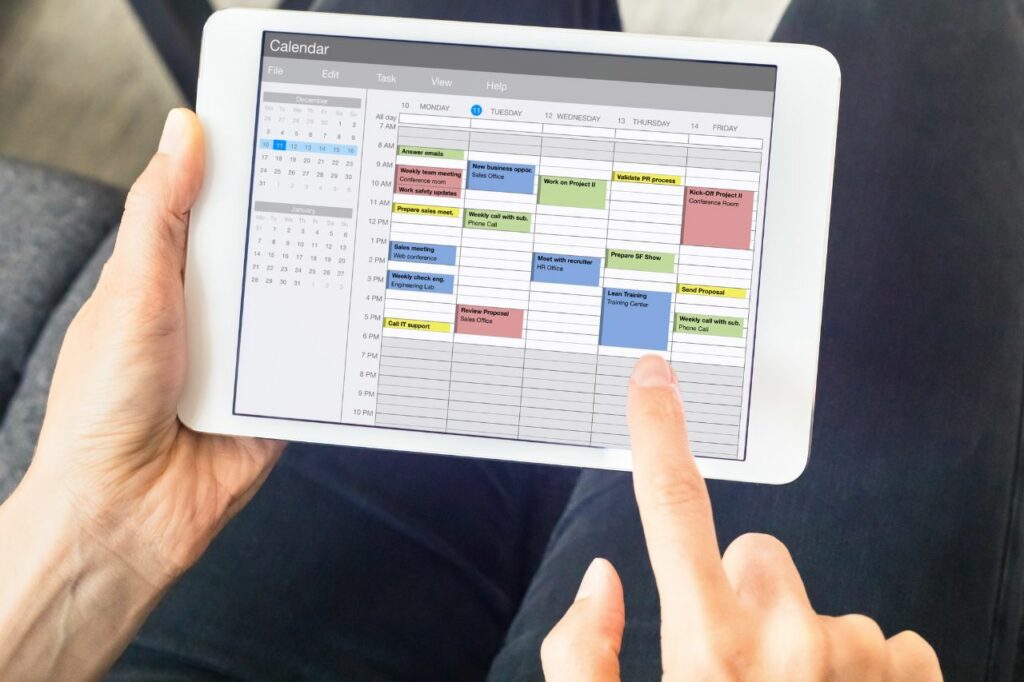You’re achieving one task that you’ve set out to complete, and that’s definitely something to be proud of. However, there are times when the workload becomes too much, and it can feel overwhelming to stay on track with your to-do list.
What are your top priorities? How do you manage to fit in eating, sleeping, working out, and running all the essential errands within a mere 24 hours?
Time management is more like a marathon than a sprint. By practicing and implementing these tips, you can create an environment that is both productive and manageable.
1. Create A Calendar

When you’re juggling a social life, a career, and personal responsibilities, it’s no surprise that your calendar fills up fast. Add in your child’s activities and self-care, such as exercising, and your day is already fully scheduled.
To begin, you need to find the perfect calendar platform that suits your lifestyle. Different formats and options for creating group calendars might sway your preference towards a particular platform.
Explore the top contenders in the calendar realm, such as Calendar, Microsoft Calendar, and Google Calendar, to find the perfect fit for your needs. Take them for a spin, examining their features and time-saving integrations, and embark on your journey towards effective time management.
Just a friendly reminder that your calendar is only as reliable as its updates. Taking the time to regularly review and revise your schedule is one of the most effective ways to ensure its accuracy.
Once you’re there, you can start color coding and prioritizing to make it work smoothly. Don’t forget to sync it with your loved ones, so everyone is on the same page and can enjoy a more balanced schedule. Before you know it, you’ll feel like life is much more organized and manageable.
2. Set Your Priorities
It is crucial to determine your top priorities in order to effectively manage your time for each task. This process begins by reflecting on what holds the utmost significance in your daily life.
To ensure easy reference, it is important to jot down the priorities that you consider most critical. This way, if you find yourself struggling to manage your time, you will already have a guide in place.
Naturally, work takes precedence as it enables you to earn the money that supports your life. Staying active and cooking may rank high on your list since they directly influence your health. Additionally, nurturing your relationships with friends and family holds great significance as it serves as a source of motivation.
Keep in mind that your priorities don’t have to remain constant every single day. They are likely to fluctuate based on factors such as your mood and the time of year.
Allow yourself the flexibility to make spontaneous decisions and switch things up if certain priorities shift. Once you do that, you can rest assured that your day is in sync with the things you consider most important.
3. Use Time Blocking
Some days, you’re absolutely determined to accomplish everything on your to-do list. However, before you know it, time has flown by and you’re left with a bunch of unchecked tasks.
Time blocking is a powerful strategy that involves allocating specific time slots for different tasks. Let’s say you set aside 30 minutes in the morning to kickstart your day.
During this time, you can take care of essential activities like brushing your teeth, following your skincare routine, and preparing and enjoying a delicious breakfast. Following that, you might dedicate an hour to a rejuvenating workout session, followed by another 30 minutes for a refreshing shower.
To make your day more productive, try following this same pattern throughout the day. Don’t forget to include some relaxation time as well. This way, you can concentrate on the tasks at hand and finish them before moving on to the next block.
If you can’t complete something, you can always readjust your schedule to fit it in later. You could even move a less important task to another day to make room for it.
You Can Also Read: Planning For Retirement: 10 Essential Financial Tips for Your Golden Years
4. Set Reminder

When you have jam-packed days and your mind is racing, it’s totally normal to forget things. You know, even if you wrote it down and said it out loud, sometimes you just forget to book or pay for that appointment. Fight back against forgetfulness by setting alarms.
Let’s say you have to schedule an appointment for your yearly check-up before a certain date. Jotting it down in your calendar or to-do list is useful, but having an alarm will definitely grab your attention.
To set an alarm, all you need is your trusty phone. Just pick a time that suits you, say 9:00 a.m., and jot down a quick description of what the alarm is reminding you of. This way, when the alarm goes off, you’ll know exactly what task awaits you.
Additionally, you’ll have designated time built into your schedule to tackle those essential tasks. This will not only provide structure but also ensure that everything runs seamlessly. Over time, you’ll bid farewell to those forgotten tasks, as they become a thing of the past.
The Bottom Line
Time management is a skill that can be quite challenging to master. Just when you think you’ve got it all figured out and your life is sailing smoothly, something unexpected comes along and throws you off track.
Life is full of movement, job switches, and unexpected responsibilities landing on your plate. However, the key lies in mastering the art of adapting to these changes and forming positive habits.
